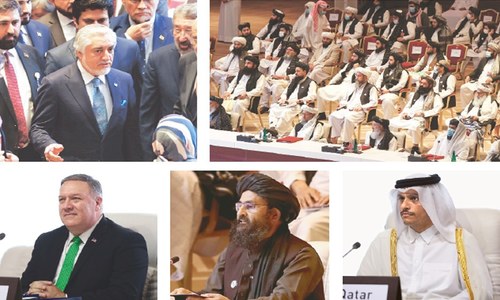DOHA: Afghan government negotiators on Sunday expressed cautious optimism for progress on thorny issues including ceasefires as peace talks with the Taliban were set to enter a more important phase in Doha.
A slick opening ceremony on Saturday saw the Afghan government, and allies including the US, call for a ceasefire. However, the Taliban, who have fought a guerilla campaign against both since they were forced from power in 2001, did not mention a truce as they came to the negotiating table.
The head of the peace process for the Afghan government, Abdullah Abdullah, suggested the Taliban could offer a ceasefire in exchange for the release of more of their jailed fighters. “This could be one of their ideas or one of their demands,” he said.
Speaking to journalists, he said the talks should continue in the “spirit of moving towards peace”. “There should first be a significant reduction in violence, then humanitarian ceasefires, and then a nationwide and permanent ceasefire.”
Baradar, Abdullah meet Qatar’s emir separately
Negotiations will be arduous and messy, delegates warned, and are starting even as bloodshed continues to grip Afghanistan.
“We will undoubtedly encounter many challenges in the talks over the coming days, weeks and months,” US Secretary of State Mike Pompeo said as he called for the warring sides to “seize this opportunity” to secure peace.
Clashes continue
Even as technical committees from the two sides were due to meet to hammer out an agenda for the talks, violence raged on the ground.
Officials said six policemen were killed in a Taliban attack in Kunduz overnight, while five officers were slain in Kapisa province.
A roadside mine blast in the capital wounded two civilians, and another explosion resulted in no casualties.
“Causing more bloodshed (during the talks) is a miscalculation. It is impossible for one side to win the war,” said Abdullah.
“With the start of intra-Afghan talks we were expecting the Taliban to reduce the number of their attacks, but unfortunately their attacks are still going on in high numbers,” Fawad Aman, a spokesman for the Afghan defence ministry, said in Kabul.
He said that on Friday, the eve of the inauguration of the talks, the Taliban carried out 18 attacks against government forces and installations across the country, inflicting heavy casualties.
“We don’t have exact information about Taliban attacks on Saturday, but I can say the number of attacks has increased instead of decreasing”.
Taliban spokesman Zabihullah Mujahid said in a statement that the insurgent group had attacked a convoy of Afghan forces that had arrived to launch an operation along a key highway in Kunduz.
He added that security forces carried out air and artillery strikes on Saturday night in the provinces of Baghlan and Jowzjan.
Nader Naderi, an Afghan government negotiator, said he was hopeful of an imminent meeting with the Taliban contact group.
“This will be the second working meeting between us. We are fired up and ready to go to end this fight,” he said.
Competing visions
During a speech at the opening event, Taliban co-founder Mullah Abdul Ghani Baradar repeated the insurgents’ message that Afghanistan should be run according to Islamic law, highlighting a likely sticking point.
Baradar and Abdullah both met Qatar’s Emir Sheikh Tamim bin Hamad Al-Thani on Sunday to discuss the process, according to Tamim’s office.
A comprehensive peace deal could take years, and will depend on the willingness of both sides to tailor their competing visions for Afghanistan and the extent to which they can agree to share power.
President Ashraf Ghani’s government wants to maintain the Western-backed status quo of a constitutional republic that has enshrined many rights, including greater freedoms for women.
Four of the 21 people on the Kabul negotiating team are women. The Taliban, in contrast, have no female negotiators.
In a statement, Ghani called for “a lasting and dignified peace” that preserves “the achievements of the past 19 years”.
Government negotiator Ms Habiba Sarabi said the start of talks had been “very positive”.
Abdullah said the process “could be the start of history made in the coming future — and hopefully sooner rather than later”.
Published in Dawn, September 14th, 2020













































